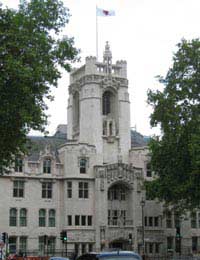The Supreme Court Explained

In 2009, the Supreme Court replaced the House of Lords Appellate Committee. It is the highest court in the UK. There are twelve judges who sit in the Supreme Court, which is now completely separate from the Government and Parliament. Not all cases can go to the Supreme Court. There must be an arguable point of law, and the case needs to have ‘public importance.’ What this means is that there is no right to appeal to the Supreme Court, as permission needs either to be sought from the court below, or from the Supreme Court itself if permission is refused at the court below.
What Does the Supreme Court Do?
The Supreme Court hears civil cases from all over the United Kingdom, and criminal cases from England, Wales and Northern Ireland. It is the only court in the UK in which virtually all proceedings are filmed. In some cases, the proceedings are broadcast on television.Criminal Cases
In criminal proceedings, in order to go to the Supreme Court you must first seek permission from the Court of Appeal. This means that you must have had an appeal at the Court of Appeal in order to do this. The application can be made by either the prosecutor or the defendant. If you have already been to the Court of Appeal, the application is considered by the Court of Appeal and permission to go to the Supreme Court is either granted or refused. If it is refused, you can then renew the application at the Supreme Court in person. This hearing will determine whether you are entitled to have your case heard at the Supreme Court or not.Civil Cases
It is also possible for the court to send a point of law of general public importance to the Supreme Court of its own volition. Only cases that have a point of law of general public importance can be heard at the Supreme Court. This means that your case has to be ‘exceptional’.Leapfrog Appeals
In some cases, it is possible to ‘leapfrog’ other courts in order to take a case to the Supreme Court. Although there are certain exceptions to this, cases from the High Court or Divisional Court, or the High Court in Northern Ireland can send cases to the Supreme Court. In order to do this, a certificate from the High Court in question must first be obtained. This will only happen if the judge in the High Court determines that certain ‘relevant conditions’ are satisfied, that there is an arguable case that requires an application for permission to go to the Supreme Court, and that all parties consent to the case being heard by the Supreme Court. The Supreme Court must also give permission for the case to be heard.The ‘relevant conditions’ are that there is a point of ‘general public importance’ and that the question relates either to the interpretation of a statute or statutory instrument, or that the judge requires clarification on a point that has been fully considered by judgments in the Court of Appeal or the Supreme Court, and on whom the judgment would be binding.
- The European Court of Human Rights
- Information About Parole Board Hearings
- Information About Mental Health Tribunals
- Information About Employment Tribunal
- What Happens at the Family Court?
- What Happens at the Coroner's Court?
- What Happens at an Immigration Hearing?
- Information about Small Claim Courts
- Information about the Crown Court
- Information about the Magistrates court
- Information about the Royal Courts of Justice
- Information about the Youth Court

Re: Information About Employment Tribunal
Hello courtroomadvice.co.uk, Is your website not attracting the traffic or leads it deserves? Would you mind if…
Re: Pre-Sentence Reports
Hello, Farheen. The correct answer to your question is, no. We can not shed any light on the reasons why you son's solicitor thinks that his…
Re: Pre-Sentence Reports
Hello Rodney, you went through the police interview wirhout a solicitor? Or used the duty solicitor? You've had your probation interview?…
Re: Pre-Sentence Reports
Hello, Farheen. It is not clear what you mean when you say that an incorrect law has been used. Incidentally, being unable to communicate is…
Re: Pre-Sentence Reports
My case was adjourned and I have now had my interview with the probation officer. Given that most magistrates courts take the PSR and…
Re: Pre-Sentence Reports
My son has a pre sentence report interview. My son cannot communicate and has mental health issues. The solictor has will submit an appeal…
Re: Failure to Attend Jury Service
I did jury service in Cardiff Crown years and years ago. I was called into court on the jury. I had 3 cases all dead boring. I…
Re: A Guide to Court Orders
Please please if there’s any advice,support or anything else you can help with please let me know, I fled the former marital home in…
Re: Pre-Sentence Reports
Hello Emz, I can understand family and health questions. They seem quite reasonable. The focus on eye problems is a bit of a mystery to me,…
Re: Pre-Sentence Reports
Could anyone help I had a presentence report done and they asked me loads of questions about my kids and partner and also if I have any…